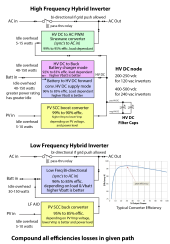Hi,
I am trying to find a hybrid Inverter/all in one which can start mppt with a low voltage. For solar I am using only panels within balconies.
I have found the 24v 3000w EcoWorthy hybrid Inverter.
Do you know of any similarly specked startup voltage hybrid inverters?
They seem very rare/I cannot find any.
Thanks in advance
I am trying to find a hybrid Inverter/all in one which can start mppt with a low voltage. For solar I am using only panels within balconies.
I have found the 24v 3000w EcoWorthy hybrid Inverter.
Do you know of any similarly specked startup voltage hybrid inverters?
They seem very rare/I cannot find any.
Thanks in advance



